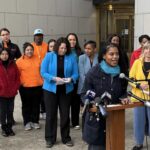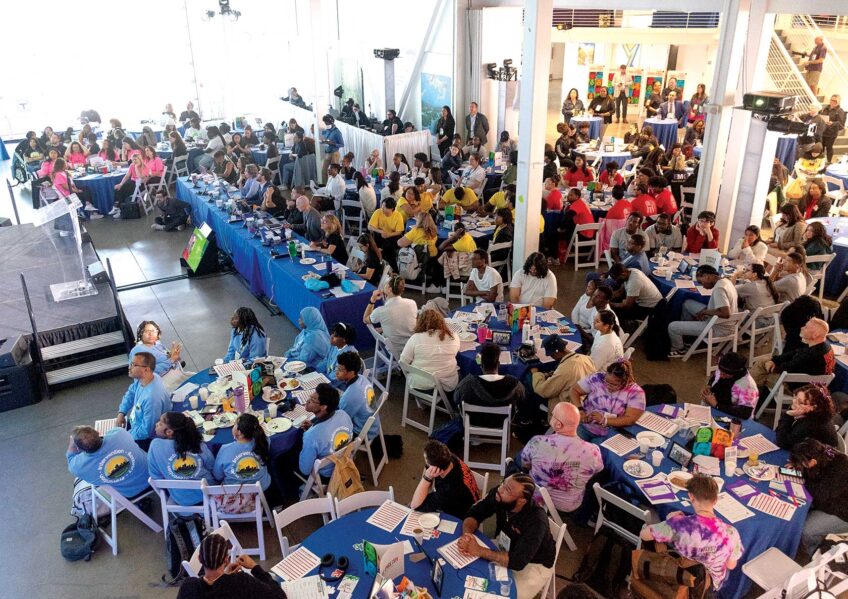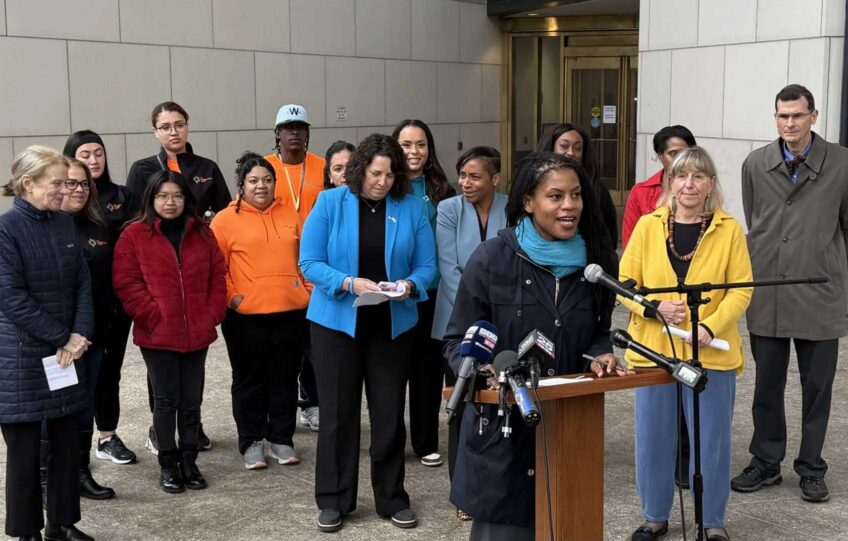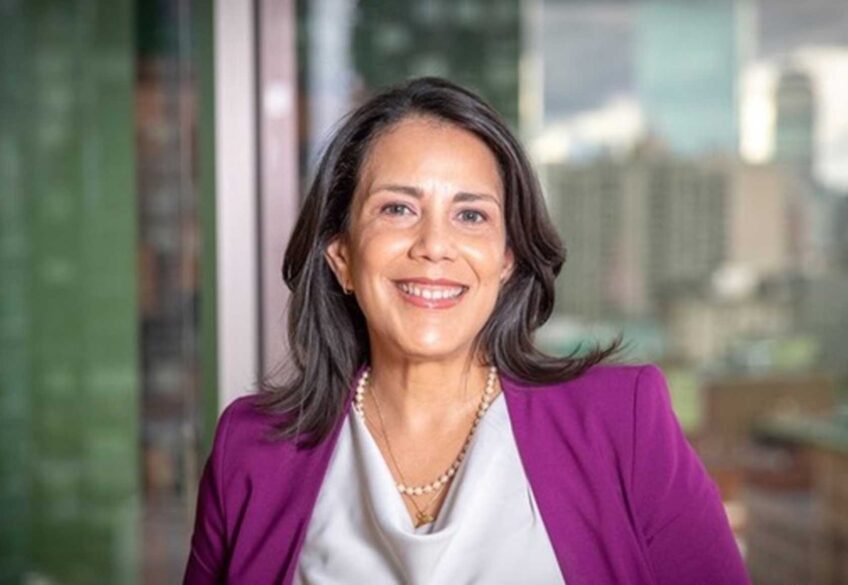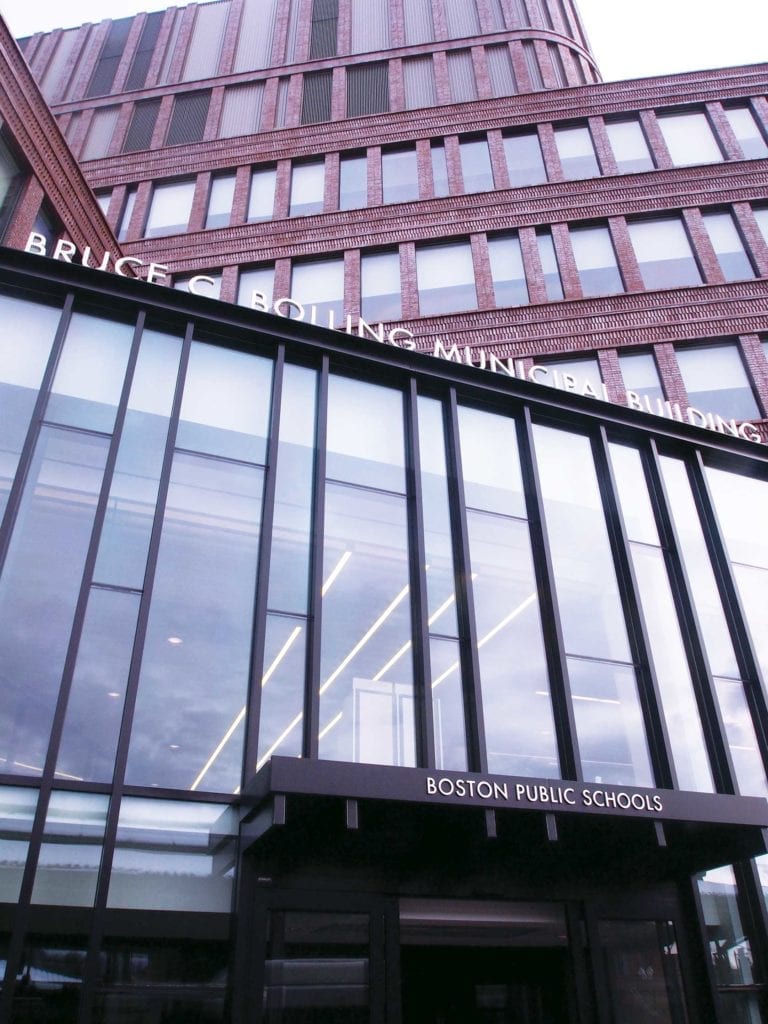
A Massachusetts Department of Elementary and Secondary Education (DESE) report, a draft of which was released last week, gave a scathing review of the Boston Public Schools, paving the way for a possible state intervention in the district.
State Education Commissioner Jeffrey Riley has indicated that a state intervention is likely, according to two people reached by the Banner who have spoken with him about the report, which has not yet been made public. There are currently 34 schools in Boston where students’ scores on standardized tests have placed them in the lowest 10% of schools in Massachusetts.
The prospect of a state intervention has raised concerns in Boston, given DESE’s record of interventions in other Massachusetts cities, as well as at the Dever and Holland schools in Dorchester.
“Overall, I don’t think the state has had a good track record on interventions,” said Boston Teachers Union President Jessica Tang. “With a high-needs student population, the last thing the district needs is more instability, more disruption and interventions that don’t support the plans that we have been advocating for as a union and the plan the superintendent has just released, which is reflective of the aspirations and needs of teachers, students and parents.”
Riley did not respond to a request for comment for this article. Copies of the report were sent to city officials last week.

Jeffrey Riley
Banner file photo
The release of the DESE report comes after BPS Superintendent Brenda Cassellius last month released a five-year plan that aims to eliminate the achievement gap in the district. The plan also calls for a redesign of secondary schools to prepare students for college and careers and would align high school curricula with the state’s Common Core standards.
Mayor Martin Walsh in January committed to increasing funding for BPS schools by $100 million over regular annual cost increases. In the Fiscal Year 2021 BPS budget, $34 million in additional funding is included, with $19 million with the additional funds targeted toward instruction and student supports, including social workers and counselors in the 34 schools identified by the state as among the lowest-performing.
Cassellius could not be reached for comment, but issued a statement through a spokesman.
“As we are in the final days of shaping our strategic plan and vision for the future of the Boston Public Schools, having the external lens of the DESE district review will only support our efforts to better serve our students, families and staff,” the statement reads. “The DESE district review provides BPS with an opportunity to reflect on progress, examine our practices, identify both systemic challenges and areas of growth, and allows us to take the necessary action to strengthen our accountability as a district. We look forward to collaborating with DESE towards our shared goal of improving outcomes for all BPS students.”
Annissa Essaibi-George, who heads the City Council’s Education Committee, is opposed to state intervention. She said Walsh’s commitment of $19 million in funding for the 34 struggling schools is a move in the right direction.
“We know schools that are struggling often are lacking supports,” she said. “We know kids are struggling with homelessness, hunger and other challenges. Providing kids with support services is what we need to do.”
Before the report was issued this week, DESE board members were already signaling support for state intervention in BPS schools. In a Jan. 28 meeting, board member James Morton spoke about the efficacy of the “empowerment zone” model, used on a cohort of struggling schools in Springfield. He suggested struggling Boston schools could benefit from a governance structure similar to that of Springfield’s zone, which has limited the district’s oversight of the schools and waived requirements of the teachers’ union contract.
Another board member, Amanda Fernández, cited a “need for change” in Boston and said the system has reached a plateau. Board members Matthew Hills and Michael Moriarty spoke in favor of keeping receivership and other forms of intervention on the table.
Yet DESE’s record on turnarounds has not inspired confidence among state education leaders.
“There’s no question that there are people in state government who would drool over the prospect of taking over schools,” said Glenn Koocher, executive director of the Massachusetts Association of School Committees. “I would have to think that DESE would understand that takeovers are not an effective option.”
In recent years, DESE has taken control of the Holyoke, Southbridge and Lawrence districts, appointing receivers to run them. In Southbridge, the district is on its third receiver in four years. DESE’s own data shows Southbridge and Holyoke as the two lowest-performing districts in the state. DESE gave Lawrence, which the state took over in 2011, the eighth-lowest rank in overall achievement, despite some gains since the takeover.
Springfield, where DESE designated 10 schools as part of an empowerment zone, is ranked the sixth-lowest-performing district in DESE’s listing. Despite the DESE board members’ call for an empowerment-zone-like approach to Boston’s 34 struggling schools, the schools in Springfield’s zone still rank among the state’s lowest percentiles.
On Boston’s 2019 DESE accountability assessment, the district was given a classification of “not requiring assistance or intervention.” The report cited “substantial progress toward targets.”
In Lawrence, where Education Commissioner Riley served as receiver until 2018, DESE lists the district as “requiring assistance and intervention” and refers to it as a “chronically underperforming district.”
While Boston’s schools have shown improvement in student performance over recent decades, with graduation rates reaching an all-time high of 75.1 percent of students receiving diplomas in four years in 2018, the district saw that rate drop to 73.2 percent in 2019. The district also has persistent gaps between the academic performance and graduation rates of white students and the black and Latino students who make up the majority of the district.
“We’re not surprised that there are issues and challenges in the district,” Tang said. “Educators, parents and young people have been saying this for the last few years. We’ve had five superintendents in the last seven years. However, I think we are poised, with the right support from the state, to have interventions that are informed by educators and stakeholders to actually have meaningful lasting change. That is the type of work we are committed to implementing with the new superintendent.”




